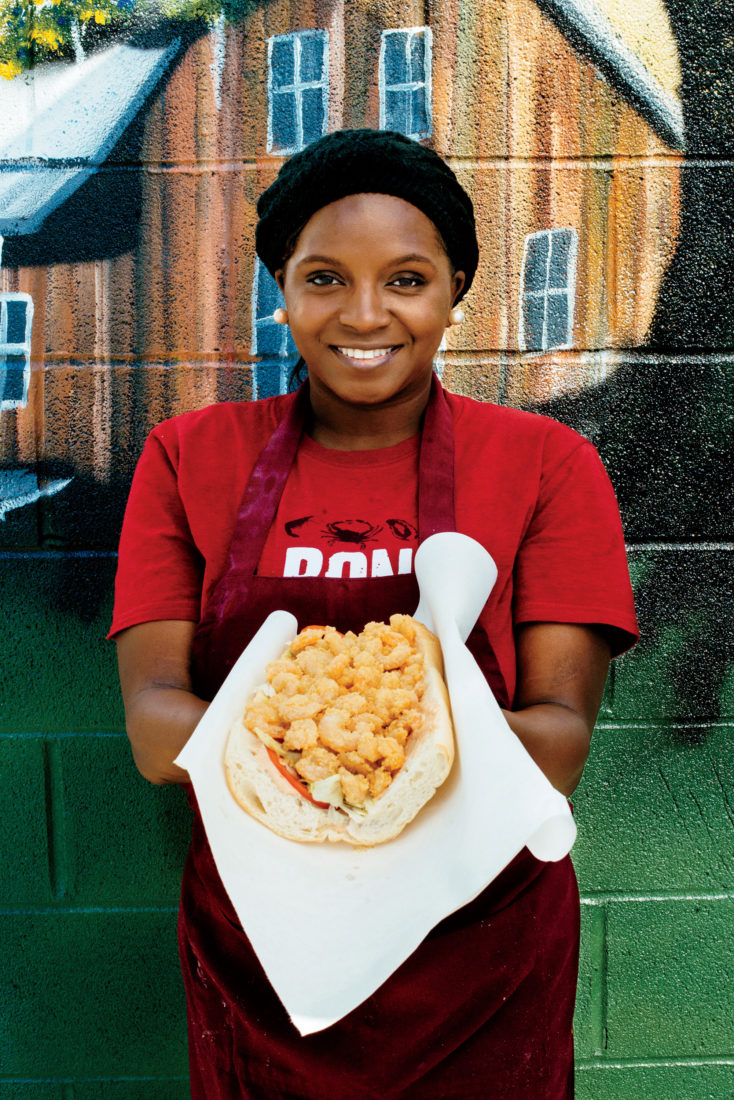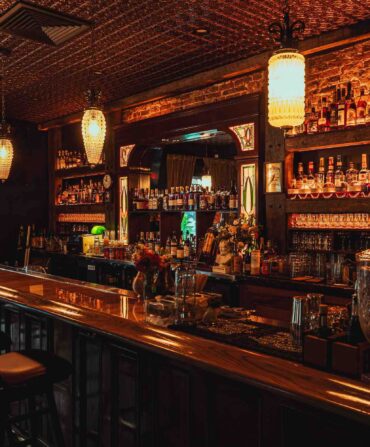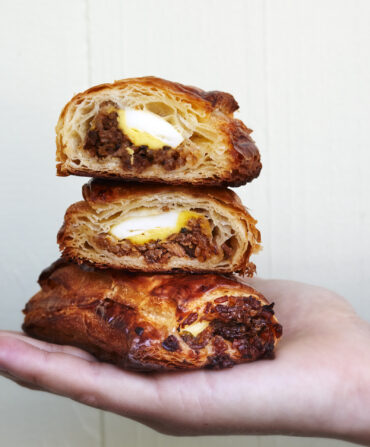“Yes, baby, the potato salad is for the gumbo.” And, “We’re Cajun, doll, we only serve Gulf shrimp.” And, “No, love, that’s ketchup and mayonnaise.” When I ask if the chunky stuff in the foam cup can replace the rice, where the fried shrimp come from, and whether the red sauce on the oyster po’boy is remoulade, those are the answers, delivered with beaming smiles by the clerks who work the registers at Bon Creole. This New Iberia, Louisiana, joint is the state’s reigning “baby, doll, love” restaurant, where the women behind the counter love on you like family and sass you like sisters.

Outside Bon Creole.
Set in a windowless cinder-block building, fronted by a vibrant mural of washboard- and accordion-playing musicians, advertised by a catawampus Mr. Pibb sign nailed to a light pole, Bon Creole began in 1982 as a crawfish-processing operation. Randy Montegut, trained at LSU as a fisheries biologist, founded the business at the height of the Paul Prudhomme–ignited Cajun craze. But when imports drove down prices for domestic crawfish, he changed course to open a restaurant in 1995. (More recently Montegut refocused his processing business on choupique caviar, harvested from the nearby Atchafalaya Basin. In the winter months, he sells the salted bowfin eggs from the same counter where customers order po’boys.)

Photo: Denny Culbert
Dressed to spill at Bon Creole.
Along with his wife, Julie, Montegut has built Bon Creole on relationships. To source shrimp, which he buys in season and freezes for year-round use, Montegut tapped fishermen he met while working as an agricultural extension agent. To make filé, which he house-grinds to thicken and perfume gumbo, Montegut tramped the upstate woods to harvest sassafras tree leaves. To grow customers, he befriended employees of McIlhenny Company, makers of Tabasco. Chefs who traveled south to visit their headquarters on nearby Avery Island soon returned home with stories of a cinder-block restaurant that overstuffs po’boys with lace-crusted shrimp and cream-cored oysters.

Photo: Denny Culbert
A local favorite.
When it came time to decorate, Montegut mounted a buffalo head and a sailfish above the Coke machine and outfitted the dining room with a tin-roofed hunt-cabin facade, topped with driftwood, bleached antlers, and a taxidermied otter. More important, when it came time to fire the stoves, he turned the kitchen over to Debbie Duplantis, a New Iberia native who began her career with him peeling and packing crawfish tails.
Early in the day, Duplantis stirs sausage and chicken gumbo, built on a dark roux. She also leads prep for weekday plate lunches of fried pork chops, crawfish étouffée, and shrimp stew. But when lunch approaches, all attentions focus on the fryer bank, haloed by a canola oil haze, and the sandwich board, where Duplantis marshals her colleagues through weekday 250-po’boy rushes.
Fifteen bucks (and a failed attempt to buy out-of-season caviar) later, I retreat to the high counter along the near wall. A toasted po’boy loaf spills shrimp before me. Cut along the belly, layered with that almost remoulade, the taper of bread erupts with shrimp like a burst cornucopia. When I lift the crown to inspect my prize, six shrimp tumble onto the butcher paper like runaway appetizers. Diminutive, fried with grace, they taste sweet and briny, redolent of the Gulf where they were netted.

Photo: Denny Culbert
Gumbo at Bon Creole.
Gumbo, bobbing with sausage, follows in a broad foam cup, topped by two smaller cups. One holds rice, the other that chunky yellow potato salad. The presentation recalls a Cajun version of a Russian nesting doll. I reach for a baby-food jar of dusky green filé powder and settle in to feast. Between sips of gumbo, spoons of potato salad, and bites of po’boy, I focus on the “baby, doll, love” ladies who work the counter, answering the phones, taking call-in orders. Bon Creole, they croon, Bon Creole, voicing a kind of Cajun affirmation.
THE MAVERICK:
Pop’s Poboys gives the classic a refresh

Like Bon Creole, Pop’s proprietor Collin Cormier and his crew stuff and dress and butcher-paper-wrap impeccable fried shrimp and oyster po’boys. But easy comparisons end there. At this corner café twenty miles north of New Iberia, in the shadow of the Lafayette city hall, hush puppies arrive with bullets of pickled okra tartar sauce or whipped cane syrup butter. Smothered collard, turnip, and mustard greens overtop cast-iron crocks.

Fried to perfection with a side of pickled okra tartar at Pop’s Poboys.
Opened in 2015, Pop’s emphasizes such offbeat po’boy combinations as fried oysters drenched in roast beef debris, french fries smothered with meatball stew gravy, red bean falafel drizzled with cayenne tzatziki, and grilled shrimp layered with pickled carrots and cilantro in the manner of Vietnamese banh mi. Best of all are the po’boys luxuriously spread with a sort of pureed crawfish remoulade and stacked with coarse-ground Rabideaux’s sausage that has been simmered in crawfish boil and grilled to a snap. Swamp Pop filé root beer, bottled by a sister business in Lafayette, is the drink of choice. This is next-generation Louisiana fare, conceived with playfulness and cooked with aplomb. popspoboys.com.
John T. Edge, writer and host of the television show TrueSouth, began contributing to Garden & Gun in its first year of publication. He is the author of The Potlikker Papers: A Food History of the Modern South and House of Smoke.








